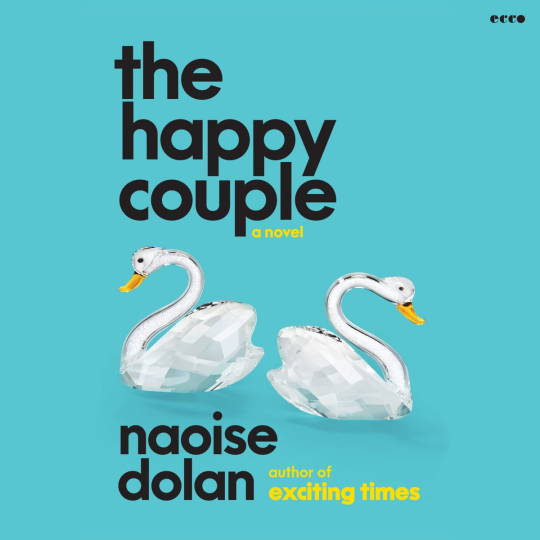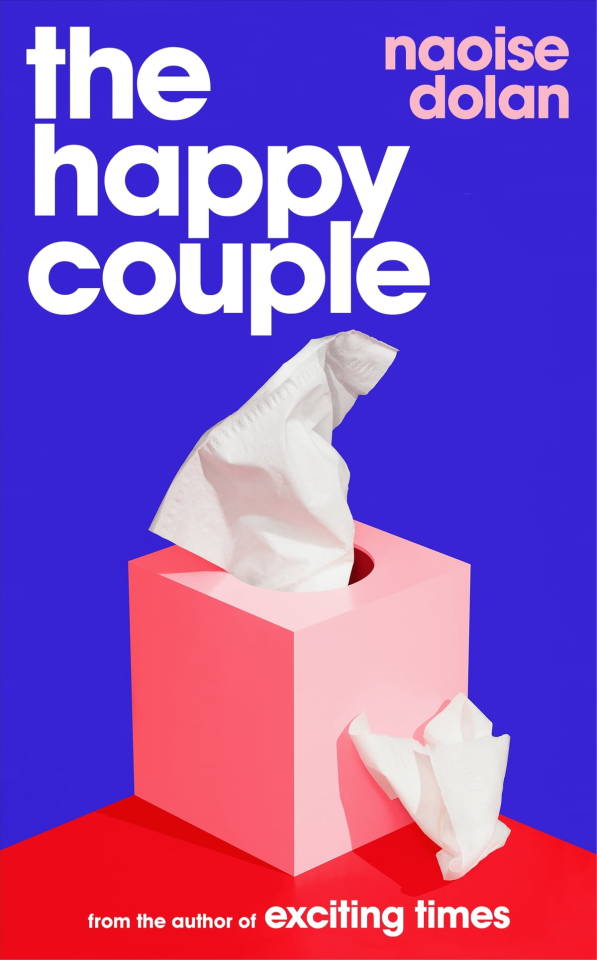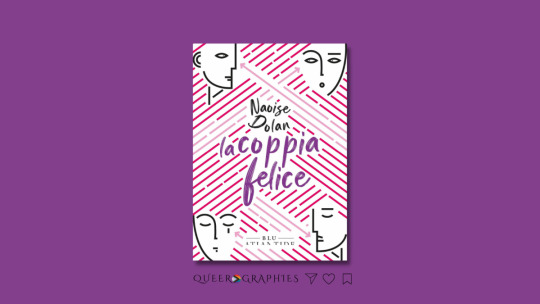#naoise dolan
Text
“Tutti abbiamo sentito di avere qualcosa di incontenibile e impossibile da capire per gli altri. Ecco perché servono le persone, al plurale: in modo che, messe insieme, capiscano tutto di te.”
— Naoise Dolan, "La coppia felice".
#naoise dolan#la coppia felice#tutti#avere#sentire#qualcosa#incotenibile#impossibiòe#capire#altri#servire#persone#plurale#modo#mettere#insieme#tutto#te stesso#libri#frasi libri#quotes
47 notes
·
View notes
Photo


Read in 2023:
You keep describing yourself as this uniquely damaged person, when a lot of it is completely normal. I think you want to feel special — which is fair, who doesn’t — but you won’t allow yourself to feel special in a good way, so you tell yourself you’re especially bad
EXCITING TIMES by Naoise Dolan ★★★¼
35 notes
·
View notes
Text

Remember the quarter-life crisis? Its prominence in the discourse harks back to a more innocent era, when stories about young urbanites couldn’t be faulted for omitting floods or wildfire smoke and when no U.S. presidential candidate actively fighting multiple felony charges had ever led polls in key battleground states.
Although Naoise Dolan’s The Happy Couple takes place in the present-day British Isles and its characters are generally aware of the dire state of the world, its characters are principally focused on understanding their own loves and libidos. The novel brings a more authentic perspective on sexuality than readers might have found a decade or two ago — both members of the eponymous couple are bisexual — but its core concerns are timeless.
That gives the book a certain universal appeal, but also presents a challenge: this is not the first will-they-or-won’t-they wedding story ever told. The author takes a kaleidoscopic approach to storytelling, rotating among the perspectives of friends and family members surrounding the eponymous pair of betrothed.
Each character intrigues, but in a relatively short novel — the audiobook runs five and a half hours — it’s hard not to feel cheated of deeper dives into the characters whose eternal happiness is most immediately in question.
read more
4 notes
·
View notes
Text
It puzzles me when people complain of not having “connected” with a protagonist. I can’t speak for anyone else on the spectrum, but I don’t always need to see myself in books. I’m not saying that I never side with characters. I feel close to Jean Rhys’s bad women, Evelyn Waugh’s fractured Catholics, Helen Oyeyemi’s escapists, Oscar Wilde’s caustic queers. But while I’m pleased when I relate, I’m not dissatisfied if I don’t. Characters usually think and act in ways I find alien. If I needed to bond with them then I’d rarely enjoy fiction. That’s not because I “lack empathy”. Non-autistics would feel as I do about “identifying” if most books were about me and not them
— I thought I was too different to see myself in a novel – but Sayaka Murata got me
#naoise dolan#sayaka murata#i thought i was too different to see myself in a novel – but sayaka murata got me#authors#writing#literature#books#reading#psychology#autism
7 notes
·
View notes
Text
The rush hour train served for company. I settled in under a man’s armpit, felt the stud of a woman’s handbag digging into me, and thought: I am part of something.
Naoise Dolan, Exciting Times
12 notes
·
View notes
Link
Two years ago in Dublin, I read the English translation of Sayaka Murata’s 2016 novel Convenience Store Woman. The first paragraph described a Japanese supermarket’s cacophony – tinkling door chime, voices, scanner beeps. I’d been to Tokyo and loved those sounds; and there it was, that embrace.
I kept reading, and kept seeing myself in the narrator. All her life, Japanese convenience store worker Keiko Furukura has had to teach herself how to behave around others. She’s relieved when her head office trainer guides her: “It was the first time anyone had ever taught me how to accomplish a normal facial expression and manner of speech.” She pretends to share co-workers’ petty irritations, and is serenely oblivious to gossip. When patronised, she only really cares about the logic: yes, yes, that was rude, but was it well argued? I’m autistic, and this is all very me.
I’d thought my brain was too different to appear in a novel, but there I was. I smiled whenever I recognised an experience, which meant I basically smiled for the whole book.
Keiko never clocks off from acting “normal”. For her and for me, socialising isn’t “leisure”. It’s more work, and there’s no manual. Employers are narrow-minded (“If I ever became a foreign object, I’d no doubt be eliminated.”), but so are most people, or they’d stop requiring us to mimic them. Keiko feels lonely in the way I often do: not because we lack company, but because praise for a persona that we cultivate for others suggests that no one loves our real self.
This sentence floored me: “She’s far happier thinking her sister is normal, even if she has a lot of problems, than she is having an abnormal sister for whom everything is fine.” That’s why I squash my emotions in public. I can’t be happy, because if I do then my voice will go monotone and I’ll forget to make the right faces. I can’t get excited because then I’ll start flapping my hands. I need to really trust someone before I can let myself feel anything around them, since I know from robust trial and error that many people will mock my spectrum traits. Keiko’s words made me feel that in my throat: the repression, and some of what I use to cover it.
It’s easy to see Keiko as a late-capitalist stooge, but I don’t read Convenience Store Woman as an interrogation of alienated labour. To me, the novel says that if one play-acts everywhere, it’s freeing to have a script. I’d never seen that in fiction: no schmaltzy girl-boss pipe dreams, just bald awareness that all human integration requires pretence if society finds you weird. I loved Keiko. She got it.
15 notes
·
View notes
Text
If something is usually done in novels, but I can’t actively justify doing it, then I don’t do it. This was how I approached the question of engaging my reader’s sympathy. I asked myself: do I want to convince the reader to like these characters? Is that a task that would interest or challenge me?
[...]
The word ‘unlikeable’ has often come up in the novel’s reception so far. But ‘the characters are unlikeable’ says nothing of greater substance than: ‘I don’t like the characters’. Critics and readers tend to favour the former phrasing; we attribute to the culture our individual response. We often don’t know whether anyone else disliked the characters in a novel. If we do know that, it’s only because we’ve focus-grouped extensively enough to feel secure in our assessment – in which case, ‘the characters are unlikeable’ isn’t a review of a book, but of its reception. Why don’t we just say, ‘I don’t like the characters’? Why can’t we own our subjectivity?
2 notes
·
View notes
Text
21.08.2022 // reading update
finished exciting times. nothing really happened and yet i was unable to let go of it. spent most of the weekend reading it and there were times i wished it wasn't borrowed from the library - my hand itched for a pencil to annotate and underline and to dog-ear pages of writing that were too mesmerizing to not go back to
3 notes
·
View notes
Text
exciting times - naoise dolan
final thoughts:
i really enjoyed this book, i loved the strong voice of the narrator, and the honest yet labyrinthine way she analyzed herself and her relationships in her inner monologue. it was really entertaining and well done, i loved how much of a mess she was. what really stuck out to me was the way she changed when around julian vs edith, and the ways that other people can bring out certain parts of oneself. slightly spoilery but the part where she accidentally hit send on the text i was screaming haha. overall really fun book and i liked getting invested in the dysfunctional-ness of her and julians relationship, contrasted with the way her approach impacted her relationship with edith.
#exciting times#naoise dolan#romance#realistic fiction#bookblr#reading progress update#book tag#book review#original post#pride
3 notes
·
View notes
Text

I like books that wax lyrical about the modern version of the marriage plot. I like this contemporary lense with its realism that skews a little stressy depressy, I like the messiness, I like the many different ways it can be framed or told. I like that it is sometimes ambiguous and rarely ends well.
The writing in this is just so sublime, it is precise, complex, honest, almost cutting, it has wit and humour. I had a blast reading about this couple about to get married and their friends and family bearing witness, I loved the exploration of all these different relationships.
Honestly, this might be a right place, right time, heightened emotion reaction but I liked every minute of the happy couple.
#the happy couple#naoise dolan#student life#english literature#irish literature#book review#zoesreviews
0 notes
Text
Vivian picked up three raspberries from the plastic punnet, chewed them, and wiped the juice from her mouth. She'd told Luke she expected to be fed, and that she hated hotel food; accordingly, he'd stepped out to Sainsbury's Local. The bed served as their table. Cocktail sausages, vegetable samosas, sushi, fruit, a one-liter green smoothie carton, all laid out on a towel--a funny sort of breakfast, but those were the best.
The Happy Couple, Naoise Dolan
0 notes
Text
[La coppia felice][Naoise Dolan]
Dopo il best seller mondiale “Tempi eccitanti”, "La coppia felice" è il nuovo irresistibile romanzo di Naoise Dolan, una delle più originali e talentuose giovani scrittrici di oggi.
Luke e Celine sono promessi sposi, entrambi sulla soglia dei trent’anni e cinicamente disillusi dal mondo intorno a loro. Eppure, agli occhi di chiunque li conosca, sono la perfetta coppia felice: Celine è una talentuosa pianista divisa tra esibizioni e insegnamento. Luke un giovane e rampante manager. Vivono a Dublino e hanno adottato una gatta che accudiscono con amore. Ma, mentre la data del…

View On WordPress
#2023#Atlantide#Atlantide Edizioni#Blu Atlantide#Claudia Durastanti#fiction#Irlanda#La coppia felice#LGBT#LGBTQ#Naoise Dolan#Narrativa#The Happy Couple
1 note
·
View note
Quote
Some books teach us about ourselves. Others teach us that not everyone’s the same.
— I thought I was too different to see myself in a novel – but Sayaka Murata got me
#naoise dolan#sayaka murata#i thought i was too different to see myself in a novel – but sayaka murata got me#authors#writing#literature#books#reading#psychology#autism
2 notes
·
View notes
Text
I’d been a pliable child and I wondered if it was obvious, even then, that I would never be an artist. If a teacher had told me to put in line breaks, I’d have sliced up my words like ham in order to please them.
Naoise Dolan, Exciting Times
5 notes
·
View notes
Quote
Some books teach us about ourselves. Others teach us that not everyone’s the same.
— I thought I was too different to see myself in a novel – but Sayaka Murata got me
#books#reading#writing#fandom#fanfiction#authors#murata sayaka#sayaka murata#naoise dolan#autism#actuallyautistic
4 notes
·
View notes
Text

The Happy Couple, Naoise Dolan.
0 notes